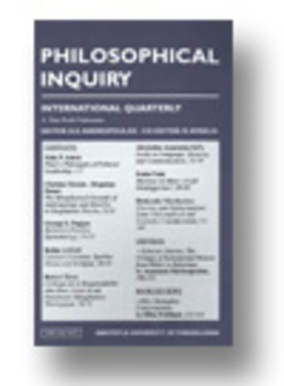Fictionalism about fictional names
Part of : Philosophical inquiry ; Vol.38, No.1-2, 2014, pages 19-33
Issue:
Pages:
19-33
Author:
Subject:
Subject (LC):
References (1):
- Adams, F, Fuller,G and Stecker, R. (1997). “The semantics of fictional names”. Pacific Philosophical Quarterly 78: 128-148Berger, A. (2005). Terms and Truth. The MIT Press.Currie, G. (1990). The nature of fiction. Cambridge: Cambridge University Press.Evans, Gareth. (1983). The Varieties of Reference. Oxford: Oxford University Press.Filippou, M. (2008). “ Ονόματα σε μυθοπλαστικές αφηγήσεις”. Δευκαλίων 26/2:195-239.Jeshion, R. (2009). “The significance of names”. Mind and Language 24:372-405.Jeshion, R. (2010). “Singular thought: acquaintance, semantic instrumentalism and cognitivism. In R. Jeshion (ed.), New Essays on Singular Thought. Oxford: Oxford University Press.Kripke, S. (2011). “Fictional entities and vacuous names”. In S. Kripke, Philosophical Troubles. Oxford: Oxford University Press.Meinong, A. (1904).On the Theory of Objects’. Αγγλική μετάφραση από τους Levi, I., Terell, D. and Chisholm, R. του ‘Uber gegenstandstheorie’ στο Chisholm, R. (ed.) (1960). Realism and the Background of Phenomenology. The Free Press.Parsons, T. (1980). Nonexistent Objects. New Haven, Yale University Press.Recanati, F.(2000).Oratio Obliqua, Oratio Recta. The MIT Press.Routley,R. (1980). Exploring Meininong’s Jungle. Monograph No. 3, PhilosophyDepartment, Australian National Universtity.Sainsbury, M. (2005). Reference without referents. Oxford.Sainsbury, M. (2009). Fiction and Fictionalism. Routledge.Salmon,N. (1998). ‘Nonexistence.'Nous 32: 277-319.Sawyer, S. (2012). “Cognitivism: A new theory of singular thought?” Mind and Language 27: 264-283.Thomasson, A. (1999). Fiction and Metaphysics. Cambridge: Cambridge University Press.Walton, K. (1990). Mimesis as Make-Believe. Cambridge: Harvard University Press.Zalta, E. (1988). intensional Logic and the Metaphysics of Intentionality. Cambridge, MA: Bradford/M IT Press.




